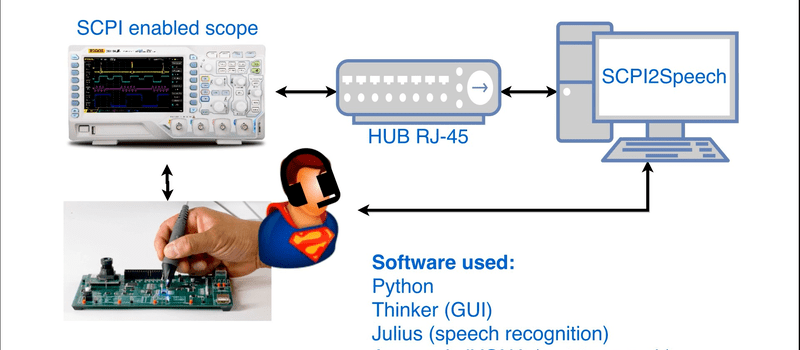We’ve been scratching our heads about the various voice-recognition solutions out there. What would you really want to use one for? Turning off the lights in your bedroom without getting up? Sure, it has some 2001: A Space Odyssey flare flair, but frankly we’ve already got a remote control for that. The best justification for voice control, in our mind, is controlling something while your hands or eyes are already busy.
[Patrick Sébastien Coulombe] clearly has both of his hands on his oscilloscope probes. That’s why he developed Speech2SCPI, a quick mash-up of voice recognition and an oscilloscope control protocol. It combines the Julius open-source speech recognizer project with the Standard Commands for Programmable Instruments (SCPI) syntax to make his scope obey his every command. You’ve got to watch the video below the break to believe how well it works. It even handles his French accent.
Better still, it does it all on his computer without sending stuff off into the cloud, so he can tailor the system to fit his needs. (The Julius system takes advantage of a known grammar and a limited set of words to increase its accuracy.) [Patrick]’s setup does use an Amazon service for optional text-to-speech responses, but that could be easily replaced with Festival or any other open text-to-speech engine if you wanted. Everything is in Python and decently documented on [Patrick]’s GitHub.
We’re familiar with Amazon and Google and Apple’s speech recognition applications, but we are big fans of open development. So hats off to [Patrick] for using Julius. We totally agree with him that putting this all onto a dedicated Raspberry Pi would be neat. But with a limited vocabulary like an oscilloscope control set, we can’t help but wonder if it’s possible to pull off something like this on a smaller microcontroller?
















It would be pretty trivial to do in C# using the SpeechRecognizer class. You could make it talk back using the SpeechSynthesizer class too. I’ve done that before but just don’t find talking to test equipment very convenient…
Useless just like any other speech controlled device …
I’m going to respectfully disagree. This seems very useful to me. Often time when using an o-scope to probe surface mount parts, it’s necessary to hold the probe(s) by hand. That means there are times when you need to fool around with the o-scope’s settings, while you’re holding the probe on a pin. Having voice control is really a great feature to have in those situations.
It’s probably still going to be faster to put the probe down, press the buttons, and apply the probe again than it is to control the unit by voice command.
Really? Did you watch the video? You can set the voltage scale with 3 words, and it’s exactly right — none of this turn knob, look at screen to see if it’s on the right scale, turn knob some more stuff.
As I mentioned, I’m totally humbug about speech recognition applications. But this one actually strikes me as useful. I guess I’d have to try it out to know for sure.
Not so much. I’ve lost track of the number of times I would have operated the scope with my *nose* if I could have, because I was already using every finger and an elbow to both keep probes set up and manage the debug interface on the computer. I’ve thought about something like a knee- or foot-board to run common commands, but there are just too many. I’m going to have to see about setting this thing up for my own scope ASAP…
I am going to disrespectfully disagree, you are a fool. As someone who mostly works my himself there are countless times I wish I had an assistant, especially a robotic one I wouldn’t have to beg for help or pay.
Just today I had a glass break while doing a synthesis and needed 3 hands to transfer the liquid before it leaked out. Turning on and off the vacuum pump with my voice would have helped immensely.
I agree. Why not just trigger by inputting a step through a separate channel? An accessory pedal is stupid simple to build: http://pedror.com/trigger-pedal/
Can an accessory pedal handle multiple different functions as well as data input?
I generally dislike speech to text interfaces, like all sensible people who have all their limbs – but this is pretty cool.
To speed it up, you could have both the verbose commands, as well as short, single syllable easy to say commands.
Accuracy of speech to text… Im not certain it is ideal for parameter entry, but the concept is still decent, the execution looks great for a first iteration, and for someone with 1 arm, or missing fingers or such, this might be an incredible improvement.
Something has “flair”. A “flare” is what you shoot. Sincerely, a German.
Listen to him, Germans know about shooting!
B^)
And doing so with flair!
I’ll show myself out.
Ach was!
MfG,
Ein Ami.
The speaking part seems of marginal use, but speaking to control it could be really useful if it works well.
Of course this isn’t totally new – HP offered it as an option on the Infinium ascopes :http://www.eetimes.com/document.asp?doc_id=1140383
And someone has patented it, though the HP thing above pre-dates it
http://www.google.com/patents/US20020143554
A nice self-contained box based on RPi etc. would be a handy gadget – Kickstarter anyone?
Our 6000 X-Series has it built in!
http://www.keysight.com/find/6000X
People either love it or don’t use it.
If I had that scope, I would be afraid to speak to it, for fear that I’d offend it. That thing’s a beast!
Haha, I think the trick is to speak respectfully. :)